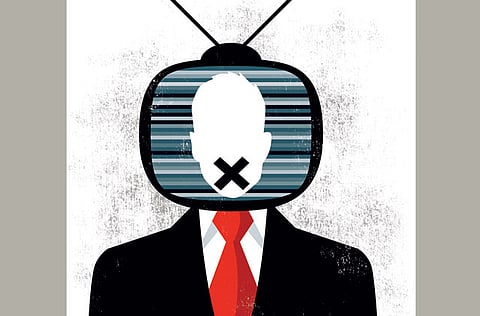Arab Spring: Battle for free speech
Cracking down on criticism and manipulating the media will backfire on governments

The crisis faced by the authorities in Egypt over what has been known as the Bassem Yousuf case is a typical one. Yousuf, a television presenter, uses humour to criticise the authorities. He uses words, symbols, and cartoons to get his ideas across to the ordinary people. In a few months, he became famous not only in Egypt, but throughout the Arab world.
Last week, he was questioned on possible charges of not only criticising the President Mohammad Mursi, but also insulting Islam, a charge which ignited public opinion in Egypt and the Arab world. In fact, the accusations angered Yousuf’s colleagues to the extent that CNN’s John Stewart held a special show on Mursi, siding with his friend Yousuf.
What is going on in the Arab Spring countries is a battle fought on the media front; a few days before the case, the City of Information in Cairo, which hosts most private television station broadcasters and where all satellite uplinks are located, was besieged by hundreds of angry protesters, belonging mainly to fundamentalist groups, demanding what they call “reforming the media”!
They prevented certain workers in the city — whom they categorised as enemies — from entering their offices, vandalised their vehicles, and even beat and injured some of them, including the newly elected general-secretary of the Egyptian Journalists Union. The obvious goal was to silence critics of the new regime.
Popular demand
The whole scene, not in Egypt alone, but in every Arab capital that witnessed political changes recently, including Baghdad, is a battle being fought for freedom of expression. It is what the masses who flocked to the street want. The return of restrictions before the change in regimes has come as a shock to the people.
An Iraqi writer — a friend of mine who I had not seen in decades — came to Kuwait a few weeks ago complaining bitterly about the limitations and restrictions placed on freedom of expression by the Iraq government, despite the fact that the American ‘liberation’ was supposed to help create a proper democracy in Iraq.
No society has advanced in modern history with a total absence of or limited freedom of speech. The problem with some new authorities in Arab Spring countries is that they think that ignoring the problems that people face every day, will make them go away.
This approach is wrong. It simply means that these problems are being swept under the carpet and are temporarily hidden from the public eye while frustration and anger simmers within a large segment of society. It should not come as a surprise that this could lead to fresh violence.
The new development pertaining to the curbing of speech involving religion is dangerous. Silencing people through accusations of insulting religion will take us Arabs back to the Dark Ages. People can agree to disagree when it comes to politics, but bringing religion into the area of varied political opinions means taking a step towards absolute despotism, which is intolerable in the modern era. It will not last even if it succeeds for a while.
Today, advances in communications and technology can spread messages across the world in a few seconds. Moreover, the fact remains that freedom of speech is considered as an essential part of human rights worldwide and has been adopted into international law and safeguarded by international bodies.
Information
Governments and nations are training their people nowadays on how to cope with the tremendous flow of information, not the lack of it, and how to prepare to filter information, even going as far as to acknowledge their shortcomings.
Arab activists, who defend freedom of speech, are mostly referring to the speaker’s corner. In central London’s Hyde Park, people can criticise the Queen with no fear. A more sophisticated argument refers to the written clauses adopted by parliaments and legislators across the developing world; they all agree that with no freedom of speech, there simply will be no human development.
The upcoming battle in the Arab world is the battle of freedom of expression, and it looks like the new authorities in the Arab Spring nations have not realised this simple fact. In their bid for power, they want to muzzle the criticism and use the media solely to praise only what they are doing, rightly or wrongly. This will not last long.
Whoever saw on television or in print media the pictures of Yousuf coming out of the court room, carried over his supporters’ shoulders, after posting hefty bail, will realise that the lines of the coming battle have been drawn in the Arab spring countries. Under the banner of freedom it will be a long battle, but we all know how it was won over the course of history.
Mohammed Alrumaihi is a professor of political sociology at Kuwait University.


